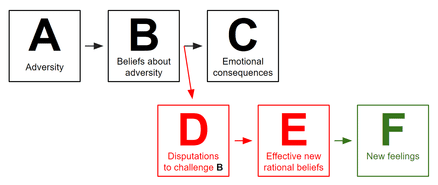Rational Emotive Behaviour Therapy, or REBT, began in 1955 with Dr. Albert Ellis. At first, it was called Rational Therapy, then Rational Emotive Therapy, and now it’s known as REBT. Dr. Ellis blended philosophy and psychology to create a method that he believed was straightforward, quick, and powerful in assisting with thoughts and behaviors. This therapy has significantly influenced our understanding of mental health.
In this blog, let’s explore “What is REBT Therapy”, its principles, its benefits, and how to get started with it.
What is Rational Emotive Behavior Therapy (REBT)?
Rational Emotive Behavior Therapy (REBT) is an action-oriented form of psychotherapy falling under the umbrella of cognitive behavioral therapy (CBT). It’s all about helping people, handling negative thoughts and unhelpful beliefs, and learning how to manage feelings, thoughts, and actions in a better way. Moreover, REBT teaches us that our emotions are closely connected to our thoughts, more than to what’s happening around us. It understands that our struggles often come from conflicts inside us rather than just what’s going on outside.
REBT guides us to think in a way that lets us express feelings and behave healthily. It’s helpful for folks dealing with various issues, such as:
- Anxiety
- Sleep difficulties
- Addictive behaviors
- Eating challenges
- Aggressiveness
- Procrastination
- Sadness
- Fears
- Strong emotions such as anger, guilt, or rage
How Rational Emotive Therapy Works?
REBT helps by changing thoughts that aren’t helpful. It guides you to see and question negative thoughts, replacing them with better ones. Therapists work with you to find harmful beliefs that make you feel upset, helping you see things more healthily. This helps you control how you feel and act in life’s challenges.
Understanding how thoughts, feelings, and actions are connected, REBT supports your mental well-being.
So, What is REBT Therapy? It’s like a tool to make you stronger and improve how you think.
Main Beliefs of REBT
Irrational beliefs, triggered by life events, can intensify emotional distress. REBT targets these beliefs, aiming to dispute and challenge them.
For instance, You mess up on a work project and think, “I’m a failure at my job because of this error.” So, you decide not to fix it, assuming there’s no point. This choice can lead to more work problems and added stress about your job.
Rational Emotive Behavior Therapy (REBT) guides you to change these unhelpful thoughts, helping you handle mistakes and work pressure more effectively.

Source- Wikipedia
ABC model:
- A: Activating events: Difficult situations occur.
- B: Beliefs: Reactions can be rational or irrational.
- C: Consequences: Outcomes result from both rational and irrational beliefs.
REBT’s Approach – DEF Framework:
REBT focuses on disputing irrational beliefs:
- D: Disputing or restructuring irrational beliefs.
- E: Creating more effective beliefs and thoughts.
- F: Feeling better by adopting rational beliefs.
This framework empowers individuals to manage their mental health actively.
Application to Real-Life:
Consider being late for a meeting:
- Rational belief: Being late occasionally doesn’t define one’s work.
- Positive consequence: Attend the meeting despite lateness.
- Reduced anxiety: Maintaining rational beliefs minimizes extra stress.
REBT’s practical techniques, recognizing and challenging harmful thoughts, ease handling challenging situations.
What are REBT Therapy Techniques?
In REBT, the therapist helps you apply the ABC model in your daily life. They work with you to change beliefs and emotional responses. An important step is recognizing beliefs causing distress, like absolute statements such as ‘I must’ or ‘I can’t.’ Therapists discourage these as unhelpful.
The REBT Techniques are-
- Problem-solving: Addressing the activating event or challenge by learning assertiveness, social skills, decision-making, and conflict resolution.
- Cognitive restructuring: Changing irrational beliefs using techniques like reframing, rationalizing, guided imagery, visualization, and humor.
- Disputation: Therapists challenge irrational beliefs, asking for evidence and exploring rational perspectives based on facts.
- Coping Techniques: Learning relaxation, hypnosis, meditation, mindfulness, and breathing exercises for situations you can’t change.
- Acceptance: Develop unconditional self-acceptance (acknowledging flaws without devaluing oneself), unconditional other-acceptance (accepting unfair treatment without devaluing oneself), and unconditional life-acceptance (recognizing life won’t always go as planned and learning to accept that).
Conditions REBT Can Help With
REBT can assist with various challenges people face, making things easier to handle. Whether it’s stress, anxiety, or difficulties in handling emotions, REBT provides practical tools to cope better.
It helps with problems like feeling overwhelmed, making decisions, or dealing with tough situations. In simple terms, if you’re struggling with your thoughts or feelings, REBT offers guidance to make things more manageable.
Benefits of Rational Emotive Behavior Therapy
REBT, developed by Ellis, aims to be a practical approach to therapy, helping people handle their emotions, thoughts, and actions. Research indicates that REBT effectively reduces irrational beliefs and changes behavior. This is seen not only in general psychotherapy but also in sports psychology, where it helps athletes by decreasing irrational beliefs and lowering anxiety.
In simpler terms, REBT brings several positive changes:
- Less anger, anxiety, depression, and distress.
- Improved health and overall quality of life.
- Better performance in school and enhanced social skills.
Effectiveness of REBT
Rational Emotive Behavior Therapy (REBT) is a helpful guide that works well for many mental health issues. It’s cool because it focuses on learning and taking action. A 2017 review looked at 84 articles and said REBT is a valid treatment for things like obsessive-compulsive disorder, social anxiety, depression, and disruptive behavior. But, more studies are needed to see how REBT can help with other conditions.
So, when people try this kind of therapy, they often see significant and lasting changes in how they feel, and cope with life’s challenges. What is REBT Therapy for Burnout, Depression, and Sports-related Issues? It’s like having a practical toolkit for improving your mental well-being.
REBT vs. CBT: Therapeutic Relationship
Rational Emotive Behavior Therapy (REBT):
In REBT, the therapist is direct and works with you to challenge and change irrational beliefs. It may feel confrontational, but the goal is mutual understanding for positive change.
Cognitive-Behavioral Therapy (CBT):
CBT is structured and goal-oriented. The therapist helps you identify and change negative thoughts and behaviors in a warm and supportive partnership. The focus is on practical improvement solutions.
Factors to Consider With REBT
REBT might seem a bit tough. For some, arguing against their thoughts might feel like a fight, and accepting that some beliefs are not good for us can be hard. Changing these thoughts is even tougher because it means letting go of beliefs we’ve had for a long time.
REBT is like a teacher for life skills, and it’s not something you just watch. You might have reading and homework in your sessions, and you’ll probably need to do things that feel a bit uncomfortable to make this therapy work for you.
How to Get Started With Rational Emotive Behavior Therapy?
To start with REBT, ask your doctor for advice on local therapists or look for mental health professionals online or in person who use this method.
In your first meeting, your therapist will talk about your goals and what made you seek help. They might jump into REBT techniques right away because this therapy is active and focused, and there’s not much time for casual chat. During your treatment, you’ll get homework and new things to try. How much you’re willing to test out new ideas and behaviors will affect how helpful REBT is for you.
Rational Emotive Behavior Therapy Is the Right Fit for You
Research keeps saying that this therapy called REBT helps lots of different people. It’s been good for individuals, groups, and even organizations. REBT works well for things like reducing problems with drinking, handling stress about school, and assisting with mental health issues like feeling sad or worried.
To figure out if REBT is a good fit for you, it’s important to chat with a therapist who knows about it. They can help you make a plan that’s just for you and show you how REBT can help you deal with thoughts that might not be so helpful. It’s about accepting yourself and the world around you. If you’re curious about What is REBT Therapy, getting advice from a therapist who knows their stuff can give you some good support made just for you.
Frequently Asked Questions (FAQs): What is REBT Therapy?
1. What is REBT therapy?
Rational emotive behavior therapy (REBT) is a type of therapy that helps people deal with thoughts that might not be so helpful, stopping them from feeling bad or acting in ways that aren’t good.
2. Which is better CBT or REBT?
Both CBT and REBT are good at helping people. They work almost the same and are both very helpful.
3. How successful is REBT?
The research found that using REBT helped medical students feel better about their depression, even after the treatment. It worked in changing the unhelpful thoughts linked to depression in medical students, right after the treatment and for a while afterward.
4. Can I do REBT on my own, or do I need a therapist?
While there are some things you can do on your own to feel better, it’s usually better to talk to a therapist who knows about REBT. They can give you personal help and support.
Conclusion
In conclusion, Rational Emotive Behavior Therapy (REBT) is a practical guide for handling life’s challenges. It helps change unhelpful thoughts, offering a toolkit for better mental well-being. Whether dealing with stress, anxiety, or sadness, REBT teaches us to manage our thoughts and actions effectively. It’s not just talk; it’s about learning and taking action. Connect with a licensed therapist for personalized support. In a nutshell, REBT is a valuable tool to make life easier and help you feel better.
At Avisa, we offer thorough and efficient treatment that takes into account the delicate and complex nature of substance use disorders and mental health issues. Our goal is to support people in achieving a long-term recovery and better quality of life. Since we think that everyone should have access to high-quality care, HealingUS Centers constantly looks for and removes structural obstacles that keep underprivileged groups from receiving care.


